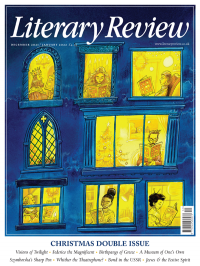Elizabeth Lowry
Friends & Strangers
Patricia Highsmith: Diaries and Notebooks
By Anna von Planta (ed)
Weidenfeld & Nicolson 1,024pp £30
Ever since Patricia Highsmith published her first novel, Strangers on a Train, in 1950, her name has been synonymous with refined and subtle malevolence. Alfred Hitchcock’s unnerving 1951 adaptation of her thriller, featuring two men who undertake to ‘exchange murders’, immediately put Highsmith country on the map. In its shifting landscape, an apparent surface normality (that engaging stranger sharing your railway compartment; the charming college acquaintance who suddenly looks you up while you’re living abroad) will give way at any moment to the irrational, the macabre, the downright demented. You can see why Graham Greene called Highsmith ‘the poet of apprehension’: her tightly sprung, quietly terrifying novels challenge the idea that suspense can’t also be literature. On her death at the age of seventy-four in Switzerland in 1995, The Times praised her for having single-handedly reinvented the whodunit as a ‘whydunit, in which an interest in the criminal and criminal psychology replaces the puzzle’.
But how did she do it? She refused to authorise a biography during her lifetime; her taciturn answers to questions about her writing were dreaded by journalists. And then, following Highsmith’s death, in a twist worthy of one of her own novels, her Swiss editor Anna von Planta

Sign Up to our newsletter
Receive free articles, highlights from the archive, news, details of prizes, and much more.@Lit_Review
Follow Literary Review on Twitter
Twitter Feed
How to ruin a film - a short guide by @TWHodgkinson:
Thomas W Hodgkinson - There Was No Sorcerer
Thomas W Hodgkinson: There Was No Sorcerer - Box Office Poison: Hollywood’s Story in a Century of Flops by Tim Robey
literaryreview.co.uk
How to ruin a film - a short guide by @TWHodgkinson:
Thomas W Hodgkinson - There Was No Sorcerer
Thomas W Hodgkinson: There Was No Sorcerer - Box Office Poison: Hollywood’s Story in a Century of Flops by Tim Robey
literaryreview.co.uk
Give the gift that lasts all year with a subscription to Literary Review. Save up to 35% on the cover price when you visit us at https://literaryreview.co.uk/subscribe and enter the code 'XMAS24'